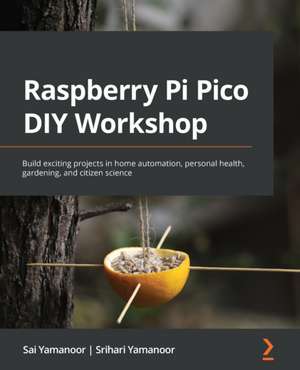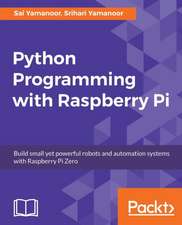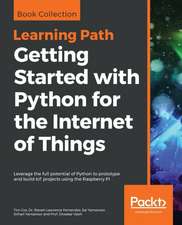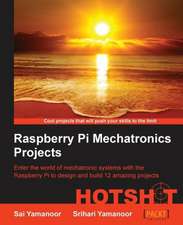Raspberry Pi Pico DIY Workshop
Autor Sai Yamanoor, Srihari Yamanooren Limba Engleză Paperback – 26 mai 2022
Key Features
- Make the most of the Raspberry Pi Pico―a low-cost microcontroller that is primed for innovation
- Work with easy-to-follow examples and learn how to interface and program a Raspberry Pi Pico
- Work on fun projects, right from home automation to building a seven-segment display to tracking air quality
Book Description
The Raspberry Pi Pico is the latest addition to the Raspberry Pi family of products. Introduced by the Raspberry Pi Foundation, based on their RP2040 chip, it is a tiny, fast microcontroller that packs enough punch to power an extensive range of applications. Raspberry Pi Pico DIY Workshop will help you get started with your own Pico and leverage its features to develop innovative products.
This book begins with an introduction to the Raspberry Pi Pico, giving you a thorough understanding of the RP2040's peripherals and different development boards for the Pico designed and manufactured by various organizations. You'll explore add-on hardware and programming language options available for the Pico. Next, you'll focus on practical skills, starting with a simple LED blinking project and building up to a giant seven-segment display, while working with application examples such as citizen science displays, digital health, and robots. You'll also work on exciting projects around gardening, building a weather station, tracking air quality, hacking your personal health, and building a robot, along with discovering tips and tricks to give you the confidence needed to make the best use of RP2040.
By the end of this Raspberry Pi book, you'll have built a solid foundation in product development using the RP2040, acquired a skillset crucial for embedded device development, and have a robot that you built yourself.
What you will learn
- Understand the RP2040's peripherals and apply them in the real world
- Find out about the programming languages that can be used to program the RP2040
- Delve into the applications of serial interfaces available on the Pico
- Discover add-on hardware available for the RP2040
- Explore different development board variants for the Raspberry Pi Pico
- Discover tips and tricks for seamless product development with the Pico
Who this book is for
This book is for students, teachers, engineers, scientists, artists, and tech enthusiasts who want to develop embedded systems that drive cost-effective automation, IoT, robotics, medical devices, and art projects. If you consider yourself a maker and would like to learn how to use the Raspberry Pi Pico, then this book is for you. Familiarity with Python programming, MicroPython, CircuitPython, embedded hardware, and peripherals is helpful but not mandatory to get the most out of this book.
Table of Contents
- Getting Started with the Raspberry Pi Pico
- Serial Interfaces and Applications
- Home Automation Projects
- Fun with Gardening!
- Building a Weather Station
- Designing a Giant Seven-Segment Display
- Designing a Visual Aid for Tracking Air Quality
- Building Wireless Nodes
- Let's Build a Robot!
- Designing TinyML Applications
- Let's Build a Product!
- Best Practices for Working with the Pico
Preț: 292.75 lei
Preț vechi: 365.94 lei
-20% Nou
56.02€ • 57.88$ • 46.60£
Carte tipărită la comandă
Livrare economică 20 martie-03 aprilie
Specificații
ISBN-10: 1801814813
Pagini: 376
Dimensiuni: 235 x 190 x 20 mm
Greutate: 0.7 kg
Editura: Packt Publishing









